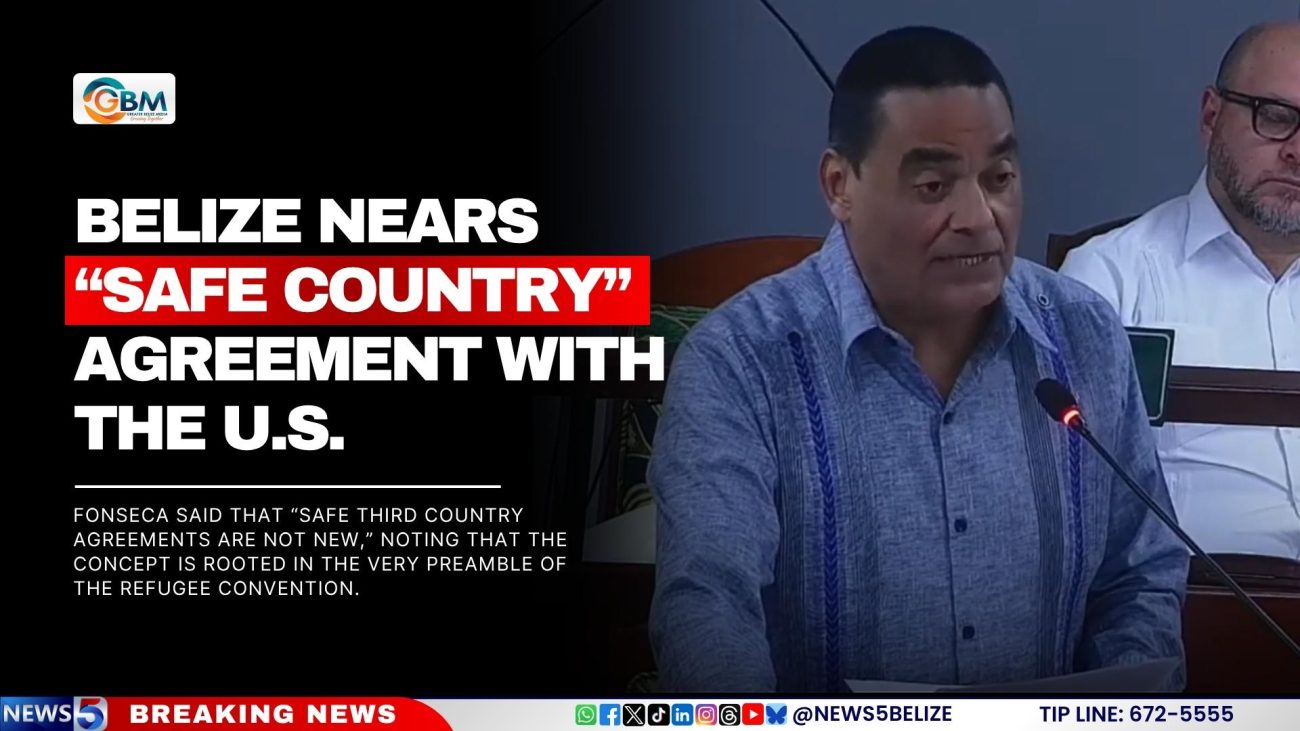Belize Nears “Safe Country” Agreement with the U.S.
Belize is on the verge of sealing a landmark migration deal with the United States, a “Safe Third Country Agreement” that Foreign Minister Francis Fonseca says will protect both Belize’s sovereignty and its humanitarian commitments.
Speaking in the House of Representatives this morning, Fonseca revealed that negotiations are nearing completion and pushed back against what he called “speculation and misinformation” surrounding the proposed agreement.
“There’s much speculation and misinformation about what a safe third country agreement is,” Fonseca told Parliament. “And therefore, clarification and information are necessary.”
The minister explained that Belize, as a party to the 1951 UN Refugee Convention, has long upheld its international obligations to people fleeing persecution and conflict.
“We have a long and proud tradition of effective management of an asylum system,” he said. “Since our independence, we have conducted several amnesty programs… including most recently in 2022. Belize is recognised internationally as a leader on migration and refugee issues.”
Fonseca said that “safe third country agreements are not new,” noting that the concept is rooted in the very preamble of the refugee convention.
“These agreements have been used by countries for decades,” he said. “A safe third country agreement can be a perfectly legal tool to share responsibilities relating to refugee obligations in an orderly manner while also protecting the rights of the asylum seeker.”
Belize’s Version Comes with Strict Safeguards
According to Fonseca, the framework being finalised with the U.S. would allow asylum seekers in the United States to be transferred to Belize for the determination of their claims, but only under tight conditions.
“The agreement we are finalising contains multiple safeguards to protect the interest and security of Belize,” he assured. “Including an unqualified veto over who is transferred to Belize, restrictions on the nationalities that could be transferred, a cap on the total transferees per year, and consideration of criminal records and professional skills.”
The proposed agreement would run for two years initially, with either party able to suspend or terminate it at any time with written notice. Fonseca said the government insisted on these safeguards, citing Belize’s limited capacity and national security considerations.
He also confirmed that the deal includes financial and technical support from the U.S. to help Belize strengthen its asylum system.
Ratification Required Before Enforcement
Fonseca stressed that the agreement cannot take effect immediately.
“The agreement cannot come into force until and unless domestic legal procedures have been complied with,” he said, explaining that it must first be ratified by the Senate under Section 61A(2) of the Constitution of Belize.
He cited the U.K. Supreme Court’s Gina Miller case as a legal precedent, reaffirming that while the executive can negotiate treaties, parliamentary approval is required for them to have domestic effect.
“This is a well-established practice recognised in the law,” Fonseca said. “The Senate and this honourable House will play our part moving forward.”
Fonseca was careful to manage expectations, saying the agreement’s signing “does not mean that persons will be transferred to Belize next week or next month.”
“The agreement will only be activated after we have worked out details of an implementation plan and operating procedures — and then only if necessary will the agreement even be used.”
Balancing Humanity and Sovereignty
Wrapping up his remarks, Fonseca said the agreement reflects both Belize’s compassion and its pragmatism.
“The agreement reflects Belize’s commitment to international law, its will to cooperate with other countries like the United States of America… and our commitment to the protection of people in fear of persecution and the values and humanity of Belize.”
He added that the U.S. remains Belize’s largest trading partner, main tourism market, and home to the largest Belizean diaspora, making cooperation between the two countries both strategic and essential.
“We have a strong commitment to cooperating with the United States of America,” Fonseca concluded, “and to upholding the values and humanity that define Belize.”






Facebook Comments